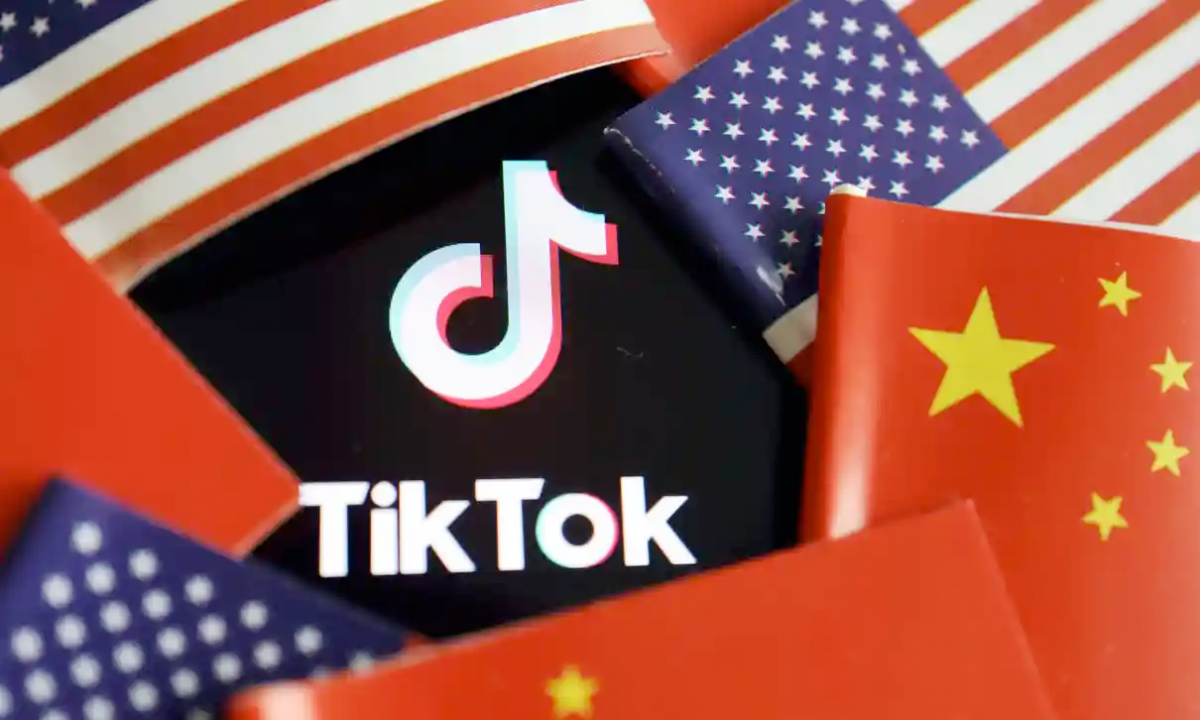banning TikTok
Should you delete TikTok?
Here’s what experts say about the app Trump wants to ban
With the US government considering banning the China-based video-sharing app, here’s what you need to know
The wildly popular video-sharing app TikTok is facing a potential ban in the US and among employees of several major companies over security concerns.
What does that mean for you?
Should you delete TikTok from your device?
Here’s what you need to know.
What is TikTok ?
TikTok is a video-sharing app similar to Snapchat and Instagram that lets users post clips that are 15 to 60 seconds long, usually set to music or a film dialogue. Videos can be “liked”, searched via hashtags and shared with others.
Where does it come from?
TikTok started as Musical.ly, which rose in popularity as a lip sync app. The Chinese company ByteDance bought the app in 2018 and relaunched it with additional features.
Since then, it has exploded in popularity, becoming the most downloaded app globally in the first quarter of 2020. Overall it has been downloaded roughly 2bn times and its user base is young, with 41% between 16 and 24.
more:
How to get verified on TikTok ?
So what’s the problem?
banning TikTok
The concerns are threefold. Because TikTok’s parent company ByteDance is based in China there are fears the company may share user data with the Chinese government, whether intentionally through data requests or unintentionally through surveillance software.
Amazon tells employees to delete TikTok – then walks it back
Read more
There are general privacy concerns about how much data TikTok collects from user devices. “The fear is that the information in TikTok could provide more details than intended about people’s whereabouts or what they are up to,” said Chris Morales, head of security analytics at the cybersecurity firm Vectra. “You could in theory track someone to a location, such as a military base or government installation.”
And there are concerns over TikTok’s code, with experts worrying that it could allow privacy and security breaches. TikTok patched several major flaws, including one found in January 2020 that would allow an attacker to control someone else’s account, upload unauthorized videos, make private videos public and delete existing videos.
Are these legitimate concerns?
TikTok does collect a significant amount of user data, research shows. To sign up, users must provide their email, phone number and a link to another social media account. The app itself requires permissions to user location, audio and camera recordings, and contacts, according to a study by the San Francisco-based mobile cybersecurity firm Lookout.
Advertisement
That’s more data than companies like Twitter and Facebook collect. Together, the information could easily be used to identify and track the actions of specific people that use the application, said Hank Schless, Lookout’s manager of security solutions. “The fact that TikTok is owned by a Chinese company makes it a legitimate security concern,” Schless added.
China is far more aggressive than other governments in compelling companies to share information, and ByteDance, TikTok’s parent company, has worked with local police forces in Xinjiang, where Beijing is accused of detaining an estimated 1 million people belonging to religious minorities in re-education camps and prisons, according to a 2019 report from the Australian Strategic Policy Institute (ASPI). The company has an active role in “disseminating the party-state’s propaganda on Xinjiang”, the report reads.
TikTok has denied it shares information with the Chinese government and has distanced itself from ByteDance, hiring the California-based former Disney executive Kevin Mayer as chief executive officer in May.
But studies have found cause for concern. One report from the security firm Penetrum found the majority of the app’s data could be traced to servers in China hosted by Alibaba, which has had security breaches in the past and shares the personal information of its users with third parties, according to its privacy policy. Servers based in China would also be under Chinese jurisdiction and thus more easily subject to data requests.
“From our understanding and our analysis it seems that TikTok does an excessive amount of tracking on its users, and that the data collected is partially if not fully stored on Chinese servers with the ISP Alibaba,” the Penetrum report said.
What if I don’t care about my privacy?
Other problems include moderation and how it is influenced by social and political norms in China. TikTok moderators were guided to censor videos that mentioned Tiananmen Square, Tibetan independence and the banned religious group Falun Gong, the Guardian found in September 2019.
Moderators were also told to suppress videos from users who appeared too ugly, poor or disabled, according to a March report from the Intercept, and to delete videos that showed protests in Hong Kong.
Who has banned TikTok?
Wells Fargo on Monday announced it would require its employees to uninstall TikTok. Amazon told employees to do the same last week, but walked back that decision claiming the instructions were sent in error.
India’s government banned TikTok and 50 other China-based apps in June, calling them a “threat to sovereignty and integrity”. Last week, the US secretary of state, Mike Pompeo, said the Trump administration was “looking at” banning the app in the US, citing similar reasons.
The US army and navy instructed service members to delete the app from military devices in December. And in March, two Republican senators introduced legislation that would prohibit federal employees from using TikTok on government-issued work phones.
The US and India each have a complicated relationships with China, with Washington and Beijing locked in a years-long trade war that shows few signs of letting up. In 2019, the Trump administration banned products from the Chinese firm Huawei from the US and just this week threatened sanctions against employees of the company.
Meanwhile, India’s ban on TikTok came after a violent confrontation between Indian and Chinese troops.
“This is the perfect storm of technology meeting geopolitical rivalry,” said Douglas Schmidt, a computer science professor at Vanderbilt University. “These kinds of things are being used as bargaining tactics in geopolitical trade negotiation.”
more:
The Best Ideas for Creative TikTok Videos & Engaging TikTok Videos
Threat Of TikTok Ban Suddenly Gets Serious:
Here’s What That Means For You

banning TikTok
A U.S. ban on TikTok could now come “within weeks,” and it is much clearer how it would work. There will not be some form of website block or internet censorship, instead TikTok will likely be added to the same entity list that Washington has used against Huawei. This threatened TikTok ban, which started as an opportunistic political point, has now gathered serious momentum. Tens of millions of American users might be about to lose their daily TikTok fix.
TikTok Banned ?
The unsolvable problem for TikTok is that allegations of cyber risk and data privacy—which can be defended—have given way to the intangible accusation of Chinese influence and control. If you want to know how easy it is to defend against that kind of charge, just ask Huawei. And so the nightmare for TikTok is that just as a ban has become more serious and more practical (through the entity list), it has also become impossible for the company to do much about.
Adding TikTok to a Commerce Department entity list would choke off its access to U.S. tech. If TikTok is not available on app stores, if it cannot be updated, then how does it reach its users? What about any U.S. hardware used in the background and U.S. cloud service providers used for storage and processing? According to the FT, any such entity list decision might come within the next month, and would “send a very strong message to China.”
It is this kind of restriction that has devastated Huawei’s sales of new smartphones outside China. The U.S. entity list denied those phones access to Google software and services, and so consumers stayed away. The phones sold well in China, where Google is banned, but not elsewhere. The latest U.S. sanctions against Huawei have also denied the company access to key chips, and it was the impact this had on security, that prompted the U.K. to ban Huawei from its 5G network.
U.S. Secretary of State Mike Pompeo’s warning to Americans earlier this month, that you should only use TikTok “if you want your private information in the hands of the Chinese Communist Party,” is similar in tone to the campaign against Huawei and has since been echoed by National Security Adviser Robert O’Brien, adviser Peter Navarro and the president himself. Trump’s presidential campaign is even running Facebook ads promoting a ban: “TikTok has been caught red handed by monitoring what is on your phone’s clipboard—Sign the petition now to ban TikTok.”
TikTok is not really a risk to national security—at least not at this moment in time. Yes, it has had its issues with data privacy and cyber security, and, yes, it’s a Chinese app collecting a lot of data on U.S. and European citizens. But all social media does the same, and foreign powers have shown they don’t need to look further than Facebook or Twitter to seek to misinform and influence.
When I reported the Apple iOS 14 clipboard issue, TikTok was quick to offer a defense: This was an anti-spam filter and would be shut down. Similarly, when I asked about the allegations it was sending U.S. citizens’ data to China, I was told that the company has a U.S. CEO and CISO, a heavyweight board, it stores its data outside China and would not provide personal data to China, even if asked.
But TikTok is owned by ByteDance, and ByteDance is a Chinese entity with a Chinese CEO and a Chinese sister-app to TikTok that is a state-compliant surveillance tool. And so I asked TikTok, given that China has banned U.S. social media platforms such as Facebook and Twitter, denying its citizens access, why should the U.S. not do the same to a Chinese owned platform?”
more:
how to get Free TikTok Followers and Likes ?!
I have yet to receive a reply.
And this is TikTok’s problem. It can implement every western security and data protection protocol it can find, but it cannot mask its provenance. And while it might be true that Beijing has never perused the data collected by TikTok for individuals or studied demographic trends, that isn’t to say it won’t. And if the Ministry of State Security comes calling, many assume ByteDance will have no choice but to comply.
All of this came to the fore when TikTok pulled out of Hong Kong after the territory’s new national security law came into force. TikTok’s decision was mixed in with other social media giants—Facebook, Twitter, Google—changing their local operations in protest. But TikTok’s reasons were very different—it could not refuse to comply with the new law as might the others, it would have no choice but to provide data and detail. Better to shut down locally than suffer the reputational hit.
There are strong parallels in the U.S. allegations against Huawei and TikTok, albeit the two companies operate in completely different spheres. In both cases, the core security allegations are unproven, relying instead on an interpretation of Beijing’s influence and control over its domestic technology sector. It’s less a case of finding a smoking gun, and more a case of “we allege that they can if they want.”
In response to such claims, TikTok says “we have no higher priority than promoting a safe and secure app experience for our users. We have never provided user data to the Chinese government, nor would we do so if asked.” Huawei has said almost exactly the same when asked, although, just like TikTok, allegations have been made that the tech giant has done exactly that.
TikTok has done all it can to protect against the allegations now being thrown out by the U.S. administration. In reality, there is little more it can do while Chinese-owned. And so there is talk of ByteDance moving TikTok to some form of arms-length U.S. corporate structure, and potentially shifting to a European HQ, although there are serious technical considerations that would come into play given where the company’s code and engineering sits.
It will be difficult for the Trump administration to simply back down now, without taking some action or introducing some sanctions against TikTok. And, unlike Huawei which operates a very limited consumer business in the U.S., this could prove an extremely unpopular move. Fortunately for Trump and his administration, Facebook is on hand with an accelerated U.S. Reels rollout, to soften the user blow and ease the politics.
The United States is ‘looking at’ banning TikTok
and other Chinese social media apps, Pompeo says
he United States is “looking at” banning Chinese social media apps, including TikTok, Secretary of State Mike Pompeo said Monday.
Pompeo suggested the possible move during an interview with Fox News’ Laura Ingraham, adding that “we’re taking this very seriously.”
Pompeo was asked by Ingraham whether the United States should be considering a ban on Chinese social media apps, “especially TikTok.”
“With respect to Chinese apps on people’s cell phones, I can assure you the United States will get this one right too, Laura,” he said. “I don’t want to get out in front of the President [Donald Trump], but it’s something we’re looking at.”
Washington’s top diplomat added that people should only download the app “if you want your private information in the hands of the Chinese Communist Party.”
“TikTok is led by an American CEO, with hundreds of employees and key leaders across safety, security, product, and public policy here in the US,” a TikTok spokesperson said in a statement following Pompeo’s comments. “We have no higher priority than promoting a safe and secure app experience for our users. We have never provided user data to the Chinese government, nor would we do so if asked.”
Pompeo’s remarks come during a time of heightened tensions between the United States and China, which have spilled over into several arenas including national security, trade and technology.
TikTok — which is owned by Beijing-based startup ByteDance — has been repeatedly criticized by US politicians who accused the short-form video app of being a threat to national security because of its ties to China. They allege that the company could be compelled to “support and cooperate with intelligence work controlled by the Chinese Communist Party.”
TikTok has said previously that it operates separately from ByteDance. It says its data centers are located entirely outside of China, and that none of that data is subject to Chinese law. US user data is stored in the United States, with a backup in Singapore, according to TikTok. A spokesperson for the company told CNN Business in May that it thinks the national security concerns are “unfounded.”
The app has exploded in popularity in the United States and other western countries, becoming the first Chinese social media platform to gain significant traction with users outside of its home country. It was downloaded 315 million times in the first three months of this year, more quarterly downloads than any other app in history, according to analytics company Sensor Tower.
The company has also run into roadblocks elsewhere. Last week, the Indian government said it would ban TikTok and other well-known Chinese apps because they pose a “threat to sovereignty and integrity.” Tensions between India and China have been escalating after a clash along the Himalayan border.
TikTok Banned in India
Here’s How Creators Have Been Dealing With It
India banned several Chinese apps overnight last month. One of the apps banned was TikTok. While TikTok’s ban seems like a distant memory now, it did leave a lasting impact on its user base of about 200 million people. But have you ever wondered whatever happened to the people creating content for the app? We talked to some popular TikTok creators to find how they are coping with the ban and where they can be found now. We also asked them how they started making content in the first place and how they monetised their content on TikTok.
All the TikTokers that we interviewed share one thing in common — their initial struggles and how they snapped out of it to amass millions of fans.
more:
What is the TikTok Creator Program ?
“I used to make small comedy scripts, but that didn’t quite work out. So one fine day I just posted a casual video with my mom and it went viral. I got views in millions,” says Akash Putti, a software engineer-turned TikToker.
The idea of earning money from making short videos was surprising to Varanasi-based content creator Shambhavi Singh.
“Four years ago, I didn’t know that I could get paid by making videos. Since then I started doing paid collaborations on TikTok,” says Singh.
“I have always tried to maintain the hygiene of my channel because views get affected if you do a lot of brand promotions,” she adds.
TikTokers are now adopting other short video sharing apps such as Chingari, Roposo and even the recently launched Instagram Reels.
Some are even biting the bullet and going for horizontal, longer form content on YouTube.
“My TikTok family is giving me love on other platforms too. They are following me on Instagram and subscribing me on YouTube. I’m getting a good response from them so far,” says 19 year-old Mohak Narang.
TikTok ban undercuts ByteDance in one of the world’s biggest digital markets
TikTok’s efforts to dominate the Indian market just hit a major roadblock.
The Indian government this week said it will ban TikTok and other well-known Chinese apps, including messaging platform WeChat and mobile browser UC Browser, saying they pose a “threat to sovereignty and integrity.”
The move follows a border clash between the two countries earlier this month that left at least 20 Indian soldiers dead.
TikTok has a lot to lose in the world’s second most populous country. India has been the biggest driver of new TikTok downloads, generating close to 660 million installs since its launch in 2017, according to analytics firm Sensor Tower.
Parent company ByteDance could “miss out on another 100 to 150 million first-time installs of TikTok in India” in the second half of this year because of the ban, said Randy Nelson, an analyst with Sensor Tower.
The ban also presents a major complication for ByteDance and other companies that are trying to take advantage of India’s internet boom, according to Akhil Bery, an analyst with the Eurasia Group.
“With only about 50% of Indian consumers online, India’s market represents a massive amount of growth potential,” Bery said in a research note on Monday. “Now, that has seemingly been cut off, and it is unlikely that the Indian government will walk back these restrictions.”
It remains unclear when the ban will take effect and how long it could last. Bery noted that the Indian government has yet to clarify how it intends to enforce the ban, or whether it plans to ask the Google (GOOGL) Play and Apple (AAPL) iOS stores to remove the apps. There is also no indication that the government plans a more sweeping effort, such as asking telecom operators to block traffic related to the apps, which would be difficult to implement, he added.
The ban means the potential loss of a lot of advertising revenue for ByteDance.
In addition to TikTok, the crackdown includes Helo, another app the Beijing-based startup has launched in India.
That means ByteDance won’t be getting a slice of the country’s booming digital advertising market, which is forecast to grow 26% to nearly 280 billion rupees ($3.7 billion) this year, according to advertising media company GroupM.
“It’s a tough slap in the face for ByteDance as they were growing 50% year-on-year in India,” said Greg Paull, an analyst with consulting firm R3.
ByteDance had forecast over $1 billion in advertising revenue from India this year, most of it generated by TikTok, according to estimates from R3. It reached $280 million in the last quarter of 2019 alone.
But losing India could have knock-on effects for TikTok’s brand, which is already suffering in the face of increased scrutiny from US lawmakers.
“In the battle for world domination, the India ban won’t hurt them in terms of revenue as much as profile,” Paull said.
The Indian government ban listed TikTok and 58 other apps, including many prominent Chinese ones.
While the Indian government’s statement did not mention China by name, it comes as military tensions between China and India continue to escalate following the deadly border clashes.
Many Indians have called for a boycott of Chinese goods and services, particularly from China’s dominant tech industry. Beijing said Tuesday that it was “strongly concerned” by the app ban.


















